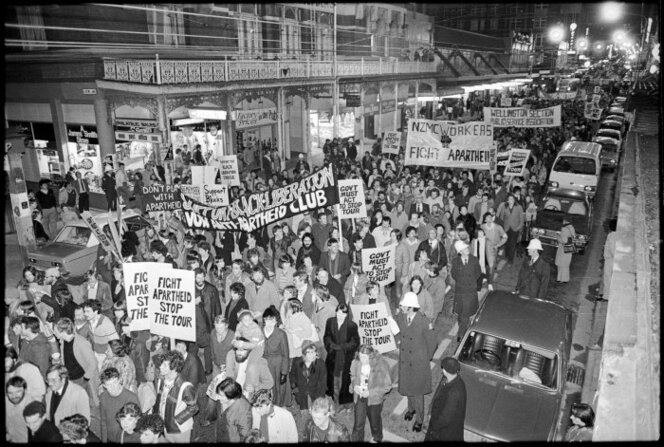Central Library closure — collection availability
Unfortunately much of our heritage collection is currently not available through our online catalogue — because of the closure of the Central Library, much of this collection is in storage. We hope to make it available again soon, but in the meantime, we suggest visiting the National Library of New Zealand in Thorndon (Corner Molesworth & Aitken St) to access these book titles and newspaper resources.
Books
Newspaper articles
Unfortunately, contemporary newspaper accounts of the Springbok Tour from 1981 fall into a time period where newspapers are generally not even indexed for searching, let alone available in full text online — see our finding historical Wellington newspaper articles resource.
That being said, information about (and sometimes the full text of) many anniversary accounts (10 years, 20 years later etc.), can be found online (see Online databases below) — and contemporary accounts can be accessed on microfilm if you know approximate dates (we've provided a table of key dates below).
Finding Historical Wellington Newspapers
Key dates
Tip: Remember that many reports will not appear in newspapers until the following day.
| Date |
Event |
| 12th September 1980 |
New Zealand Rugby Football Union (N.Z.R.F.U.) formally invites the South African rugby team to tour New Zealand. |
| 1st May 1981 |
First organised mass protests take place throughout the country. |
| 14th May 1981 |
The Prime Minister Robert Muldoon is presented with an ultimatum by the Commonwealth to cancel the tour or lose hosting rights to Commonwealth Finance Ministers Conference due to take place in Auckland. |
| 10th July 1981 |
The NZRFU meet for the last time to decide whether the tour should proceed or be cancelled. |
| 19th July 1981 |
The Springboks arrive in New Zealand landing at Auckland airport. |
| 22nd July 1981 |
First game played - Springboks vs Poverty Bay in Gisborne. |
| 25th July 1981 |
Springboks vs Waikato game in Hamilton called off following a pitch invasion by protestors. |
| 27th July 1981 |
The government says it won't back down in the face of violent protests and promises the police the assistance of the NZ army if required. |
| 29th July 1981 |
Anti-tour protests outside Parliament reach a new level of violence in an event which becomes known as the "Battle of Molesworth Street" |
| 31st July 1981 |
The Prime Minister threatens to call a snap election if anti-tour violence continues to escalate. |
| 1st August 1981 |
Springboks vs. Manawatu in Palmerston North |
| 2nd August 1981 |
In his speech at the annual National Party Conference, Robert Muldoon claims that the extreme-left wing agitators have taken over the anti-tour protest movement. |
| 11th August 1981 |
Springboks vs. Otago in Dunedin. |
| 13th August 1981 |
The grandstand at Rugby Park in Christchurch is destroyed by fire in a suspected arson attack after a Springboks training session at the ground. |
| 15th August 1981 |
First test played in Christchurch |
| 29th August 1981 |
Second test played in Wellington |
| 12th September 1981 |
Third test played in Auckland. |
| 13th September 1981 |
Springboks depart New Zealand |
Magazines — online databases
Our online databases can also be used to access a large number of articles about the tour which have previously been published in magazines. Though the databases do not go back as far as 1981, they do contain many retrospective articles written since then.
To access contemporary accounts of the Springbok Tour in magazines, we recommend visiting the National Library on Molesworth Street (see collection note above).
To find magazine titles of interest, have a read of the article below:
Story — Magazines and periodicals in New Zealand
Heritage Links (Local History)


